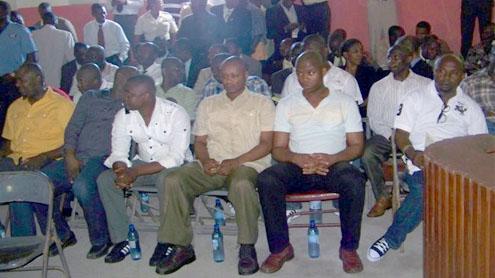 LES CAYES: A judge convicted eight police officers Thursday in a landmark trial for their role in a prison riot that saw at least 10 prisoners shot to death in the chaotic aftermath of the January 2010 earthquake.
LES CAYES: A judge convicted eight police officers Thursday in a landmark trial for their role in a prison riot that saw at least 10 prisoners shot to death in the chaotic aftermath of the January 2010 earthquake.
The successful prosecution, concluding two years to the day after the uprising, was considered at least a small victory for the court system of an impoverished Caribbean nation where criminal cases seldom reach trial and law-breaking officials walk with impunity.Judge Ezekiel Vaval said six other police officers were innocent as he ended a three-month trial in the southwestern town of Les Cayes.One of those convicted was a senior officer who fled before the trial and was convicted in absentia after witnesses testified he took part in the killings and ordered others. The seven others convicted were present during the trial.
The police officers were accused of murder, attempted murder and other crimes after they allegedly opened fire on inmates during a prison riot in Les Cayes one week after the quake.Sentences ranged from two years to 13 years of hard labor. The defendants had faced the possibility of up to life in prison.”The decision of the judge is his expression of the truth,” Vaval said as the power flickered on and off in a packed courtroom under tight security. “There are other versions that exist but this is mine. And that is the law.”
Vaval said he reached his decision based on dozens of witness testimonies. He said officers even gassed inmates who couldn’t have posed a threat because they were unarmed and choking on tear gas.Shouts of joy erupted from supporters of both the defendants and the prosecution when the judge read aloud the split verdict in the Catholic community center being used as a makeshift courtroom.For the son of one of the inmates killed, the ruling didn’t go far enough. “A part of me is satisfied, but there are no damages to compensate me for losing someone so dear,” said Jackson Theze, 23.
Lawyers for the officers had argued that the police officers were trying to break up a riot under difficult circumstances and it was unclear who actually shot the prisoners, saying some may have been killed by fellow inmates.The trial itself was a rare occurrence in Haiti, a country where the judicial system barely functions and public officials are rarely held to account. The judge told The Associated Press before the verdict that he had received threatening phone calls and carried a gun for protection because he feared for his life. He traveled to New York in December to mull safely over his decision.
The last time Haiti’s beleaguered justice system showed it could handle tricky cases involving high-profile defendants was in 2001. Dozens of former military and paramilitary leaders were tried for their role in a seaside massacre in a city north of Port-au-Prince. But the convictions were later overturned in another reminder that impunity has long been the norm in Haiti.”This is a good step to fight against impunity,” said Pierre Esperance, executive director of Haiti’s National Human Rights Defense Network. “We’re not 100 percent satisfied, but (the authorities) made an effort.”
Twenty-one other officers fled before the trial.One of them, police commissioner Olritch Beaubrun, was sentenced to 13 years of hard labor because witnesses testified that he also ordered the killings as well as participated in them.Vaval said the other 20 defendants who evaded prosecution will be tried in abstentia later and will have an extra year tagged onto any sentence they may receive.
The verdict was “not satisfying but I have no comment beyond that,” said lead prosecutor Jean-Marie Salomon.Defense attorney Jean-Eugene Pierre-Louis said it was good that a verdict was reached, but he planned to appeal.”I have the right to be dissatisfied with the convictions,” Pierre-Louis said. “But the fact that we had a verdict at all is a big deal for Haiti.” – Yahoonews











